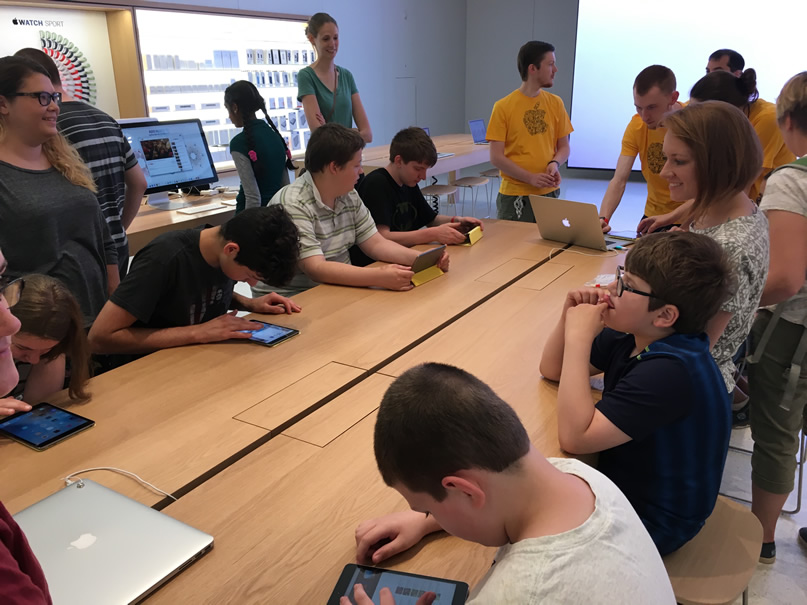
As an Apple Distinguished Educator and the head of Instructional Technology at Wildwood School in New York State—a comprehensive educational program for students with autism spectrum disorders, neurological impairments, and complex learning disabilities—I am thrilled with the opportunity to set up multiple trips to our local Apple store. I work closely with our educators and the store’s educational team to provide a fun and meaningful learning experience for our students with autism and developmental disabilities.
Recently, some students from every level, along with some of the adults in our Day Hab program, went to the Apple store at Crossgates Mall in Albany. We had already decided on the general topic, and students would be creating digital memory books using iPads and the app Comic Life 3. During past field trips, we used iMovie, Keynote, and several other creation tools. To prepare for this specific trip, I had asked the staff to familiarize themselves with Comic Life 3 and have the students do some pre-planning so they could focus on the experience when they were in the Apple store.
The beauty of these trips is that all students have the opportunity to share their voice. With the support of the educational store team and our staff, students become creators, authors, communicators, and collaborators. No matter the device, students can create and share their voice by whatever means works for them. Whether they use built-in accessibility features to communicate in pictures, voice, text, or a combination of two or three, every single person creates a product that represents who they are and the memories that are meaningful to them. Every single individual has a voice and has the opportunity to share that with others.
These trips are about far more than simply creating—they’re more about the process than the product. They allow students to work on important and essential skills, and the Apple store educators understand and embrace this. For some students, it’s about walking and navigating a mall/store safely. For others, it’s about seeking out a staff person and asking for help. Some students practice waiting skills, and others practice collaboration and cooperation skills. There are endless opportunities for skills practice and generalization.
With the support of everyone involved, and a fun and engaging project as the foundation, every student finds success, shares their voice, and leaves with a smile. Thanks to the Apple store, they also leave with a t-shirt and a USB bracelet with their project on it (or something similar), so they can share it with their families, their peers, and school staff. I have witnessed students hurry back into the school after a field trip, and immediately ask to share their work with others. The ability to see their products on the large screen is amazing, but pales in comparison to the look of pride on their faces. Then to see their educational team extend these lessons, sometimes through the entire year, is really something special.
For some pictures, samples, and smiles from this specific trip, please see the pinned post on my Educational Technology for All Learners Page. I would love if you join in this community with me and share your related stories and experiences as well.
I encourage you to reach out to your local Apple Store and learn more about what they offer for field trips and other group trips. The focus is on the individual; ensuring they have a memorable and meaningful learning experience. The impact the Apple store staff has on their community is great and often goes unnoticed. They are more than a retail store: They are educators and advocates with a passion to create positive change in the lives of those around them. One of the educational creative team members at Apple Crossgates recently reminded me of a memory she cherishes from our first trip to the store years ago. “The first year you brought students to the store when I was here, there was a young man who wrote an alphabet book in Keynote,” she shared. “At the end he said, ‘I wrote a book! I’m like Superman!’ It inspires me regularly and reminds me of how important your work is and Wildwood’s work is, as well as the small contributions we can make from this store.”
Let’s give all of our students and children the opportunity to share their voice with the world, in whatever way possible. Let’s keep creating, collaborating, communicating … and proudly smiling.
In the words of Steve Jobs: “What is Apple, after all? Apple is about people who think ‘outside the box,’ people who want to use computers to help them change the world, to help them create things that make a difference, and not just to get a job done.”
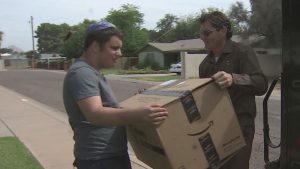 Do you know that giddy feeling that you get when the UPS man drops a package off at your door? Even if you know exactly what’s in it, it can still feel like your birthday. So you’ll understand why 14-year-old Asher Schnitzer loves the excitement of a UPS delivery.
Do you know that giddy feeling that you get when the UPS man drops a package off at your door? Even if you know exactly what’s in it, it can still feel like your birthday. So you’ll understand why 14-year-old Asher Schnitzer loves the excitement of a UPS delivery.


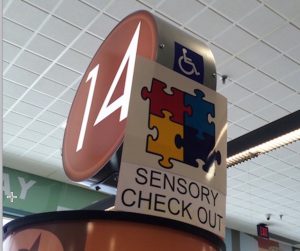 Every parent knows how annoying the checkout aisles in supermarket and big box stores can be when the kids are shopping with them, no matter if the kids are on the spectrum or not. After all, by the time we get to the checkout, we’re likely frazzled and just hoping that we’ve managed to remember everything we need. When we finally roll our cart to the checkout line, we know we’ve almost made it and it’s just a few minutes until we’re out the door! But there they are—the dreaded gum and candies and toys—more little unnecessary doodads that we don’t want and don’t need.
Every parent knows how annoying the checkout aisles in supermarket and big box stores can be when the kids are shopping with them, no matter if the kids are on the spectrum or not. After all, by the time we get to the checkout, we’re likely frazzled and just hoping that we’ve managed to remember everything we need. When we finally roll our cart to the checkout line, we know we’ve almost made it and it’s just a few minutes until we’re out the door! But there they are—the dreaded gum and candies and toys—more little unnecessary doodads that we don’t want and don’t need.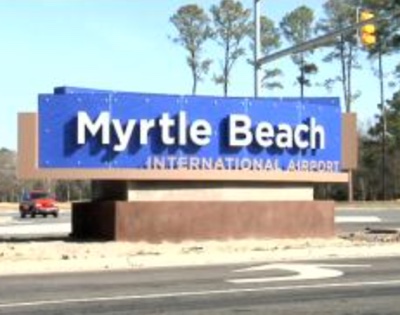
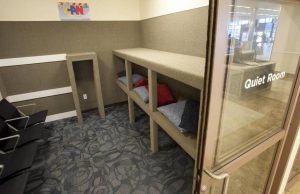 Back in the beginning of 2016, the town of Surfside Beach, South Carolina,
Back in the beginning of 2016, the town of Surfside Beach, South Carolina, 
 This past Sunday, the J.C. Penney store at Timber Creek Crossing in Dallas, Texas, held its first shopping event for families with autistic children. The private, two-hour, back-to-school event was developed with help from the
This past Sunday, the J.C. Penney store at Timber Creek Crossing in Dallas, Texas, held its first shopping event for families with autistic children. The private, two-hour, back-to-school event was developed with help from the 
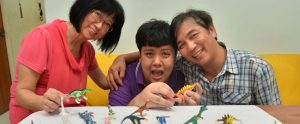 Even if you don’t care about the world of fashion or keep a scorecard on the various diplomats who visit the White House, chances are you’ll still be interested in this story. This past week, when the Prime Minister of Singapore visited President Obama, his wife Lee Ho Ching was photographed carrying a simple and fun dinosaur clutch bag designed not by a famous designer, but by a 20-year-old man with autism.
Even if you don’t care about the world of fashion or keep a scorecard on the various diplomats who visit the White House, chances are you’ll still be interested in this story. This past week, when the Prime Minister of Singapore visited President Obama, his wife Lee Ho Ching was photographed carrying a simple and fun dinosaur clutch bag designed not by a famous designer, but by a 20-year-old man with autism.





 According to many military parents, the U.S. Department of Defense isn’t the most progressive employer. Some parents of military dependents with autism—
According to many military parents, the U.S. Department of Defense isn’t the most progressive employer. Some parents of military dependents with autism—